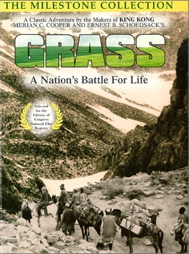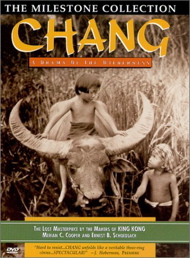| Release List | Reviews | Price Search | Shop | Newsletter | Forum | DVD Giveaways | Blu-Ray/ HD DVD | Advertise |
| Reviews & Columns |
|
Reviews DVD TV on DVD Blu-ray International DVDs Theatrical Reviews by Studio Video Games Features Collector Series DVDs Easter Egg Database Interviews DVD Talk TV DVD Talk Radio Feature Articles Columns Anime Talk DVD Savant HD Talk Horror DVDs Silent DVD
|
DVD Talk Forum |
|
|
| Resources |
|
DVD Price Search Customer Service #'s RCE Info Links |
|
Columns
|
 |
GRASS & CHANG |

|
Grass: A Nation's Battle for Life Image/Milestone Street Date March 28, 2000 / 29.99 1925 / 1:37 flat full frame / B&W / 71 min Starring Merian C. Cooper, Ernest B. Schoedsack, Marguerite Harrison, Haidar Khan, Lufta Cinematography Merian C. Cooper, Marguerite Harrison, Ernest B. Schoedsack Film Editor Richard Carver, Terry Ramsaye Original Music Hugo Riesenfeld Written by Richard Carver, Terry Ramsaye Produced and Directed by Merian C. Cooper, Ernest B. Schoedsack |
Grass is a first person account of the Bakhtiari tribe of what is now Iran and their epic migration to greener pastures high over inaccessible Asian mountains. Cooper, Schoedsack and their partner Mrs.Marguerite Harrison accompanied the Bakhtiari on the trail, recording amazingly beautiful hand-cranked silent movie footage of the entire trip. Except for a couple of portrait shots at the beginning, the filmmakers don't appear. Harrison is a main character in a long traveling segment from Turkey to Iran by camel route, and then our attention transfers to the Bakhtiari chieftain Haidar Khan and his son Lufta.
The nomads strike their tents and herd tens of thousands of domesticated goats, horses, sheep and cows over what we can see for ourselves is an impossible trail. It takes days to cross a broad, swiftly-flowing river, floating women and children over on rafts made of inflated goatskins. Everyone else, including the animals, just piles into the water to be swept downstream through rapids. It's difficult to believe that anyone survives.
The second half of the journey involves lugging the entire nation up a mountain that the goats have difficulty climbing. It's a thrilling thing to watch and contemplate as the lines of people stretch for miles up mountain switchbacks. The filmmakers have a faultless eye for good camera angles.
Most amazing is that the movie was made by only three people without much in the way of outside help. They trekked along with the Bakhtiari while taking care of their cameras and film supplies. Early episodes show some meals and other customary details of the tribesmen but the focus is on the big picture - to survive the nation must migrate and everything else is of secondary concern.
Grass is a practically a self-invented documentary. Minor events are posed and directed but it doesn't matter as nothing extraordinary is being recorded - little Lufta would indeed probably pack his father's water pipe onto a pack animal. Cooper and Schoedsack take time out to record cute animal behaviors or to simply note their presence. The intertitles make simple jokes but are completely free of expected patronizing or critical attitudes. The filmmakers may not have the deepest anthropological insights about their subjects, but they obviously respect them. The film ends with a shot of a signed declaration of Chief Haidar Khan and a regional colonial bureaucrat stating that the filmmakers' journey with the Bakhtiari was real.
Milestone's DVD of Grass is accompanied by an interesting middle-Asian musical score. There's also a priceless series of audio interviews with Merian C. Cooper made by Rudy Behlmer in 1965 that span a wide part of his lengthy career in adventurism both abroad and in the movie business.

|
Chang: A Drama of the Wilderness 1927 / B&W / 69 min. Starring Kru, Chantui, Nah, Ladah, Bimbo the Monkey Street Date November 21, 2000 / 29.99 Cinematography Ernest B. Schoedsack Original Music Hugo Riesenfeld Written by Achmed Abdullah, Merian C. Cooper Produced and Directed by Merian C. Cooper, Ernest B. Schoedsack |
The enormously popular Chang was made under much different conditions. Instead of going on a trek with nomads, Cooper and Schoedsack created a story around the daily lives of some jungle farmers in the wilds of Thailand. Almost everything in the movie is staged but it still has the basic ring of truth, as the filmmakers fashion events from reality instead of imposing events and characterizations on their subject.
Milestone's DVD this time around has the distinct advantage of an excellent commentary by Rudy Behlmer, who reviews the astounding careers of Cooper and Schoedsack and the amazing conditions under which Chang was filmed. On a handshake from his Hollywood backer, the two of them set out for Thailand and then headed up to regions then still mostly inaccessible, where only a few outsiders had ever been. They stayed for over a year fashioning their drama using local help and their own limitless ingenuity. Just the story of how they kept their cameras and film from instantly rotting in the heat and mildew of the jungle elicits a "gee whiz" reaction, and from there the adventure only gets wilder.
In addition to episodes documenting everyday life (Schoedsack's main interest) the film takes in two grand dramas (Cooper's forte), a hunt for man-killing jungle cats and a wild elephant stampede. Working from blinds, they capture some truly frightening shots of huge tigers coming down to the water to drink. The lenses aren't telephoto, letting us know that they were very close to their subjects. They staged various attacks and chases by capturing cats and letting them out of cages when the cameras were running but we're barely aware of the trickery. The basic truth of the situation is that the two filmmakers must have been calmly cranking away while threatened by deadly animals not eight or ten feet distant. The film's most famous shot is a down angle from a tree as a tiger leaps up and climbs right into our faces, and it must have been a shocker in 1925. Schoedsack not only didn't stop cranking, he had the presence of mind to pull focus as the animal practically licks the lens. It's pretty amazing.
The second major climax is an elephant stampede, a scene too complicated to capture naturally that was staged with elephants already in the Thai royal corral. But the dramatic angles and cutting sensibility show Cooper and Schoedsack capable of handling action logic as complicated as any being filmed at the time. The sequence is no less exciting now than it was then.
Fans of King Kong will have a lot to think about while watching these shows; Cooper and Schoedsack are somewhat like Kong's Carl Denham but with major differences. They obviously saw the Denham character as an exaggerated and crass self-portrait, but possessed of their zeal to distinguish themselves by bringing back amazing jungle adventures. Unlike Denham, the real filmmakers showed respect and consideration for the people they visited and documented, and they didn't bring along a retinue of helpers ... and Marguerite Harrison didn't qualify as the Ann Darrow type. They also stayed true to a pact to respect all the local customs of the natives, stay clear of the women (wisdom, surely) and leave things as they found them. That's quite different from Carl Denham, who brings chaos and destruction to Skull Island just so he can have a prize to exhibit back on Broadway.
Kong fans will also note familiar bits of business like a woman grabbing up a forgotten baby just before the elephant stampede catches up with it. It's easy to imagine the two successful filmmakers doing well but getting bored back at RKO, and then seeing Willis O'Brien's magical movie effects. The expeditions they could no longer take could be re-molded into a fantastic jungle tale nobody would ever believe ...
Rudy Behlmer's excellent commentary is good enough to listen to on the first viewing of Chang, but Milestone has also included a terrific Thai-flavored score composed by Bruce Gaston and performed on authentic instruments by an orchestra called Fong Nam. There's also a press kit for the film, an essay on the production and an odd proto-colorized version of a scene from the film made in 1956 when Cooper was producing The Searchers. It's all done with hand-rotoed mattes and has to be adjudged a failure -- but a typically prophetic one.
On a scale of Excellent, Good, Fair, and Poor,
|
Grass rates:
Movie: Excellent Video: Very Good Sound: Excellent Supplements: Audio interviews with Merian C. Cooper, |
Chang rates:
Movie: Excellent Video: Very Good ++ Sound: Excellent Supplements: Rudy Behlmer interview, essays, stills and ad art, Color test |
Reviewed: November 6, 2005
Review Staff | About DVD Talk | Newsletter Subscribe | Join DVD Talk Forum
Copyright © DVDTalk.com All rights reserved | Privacy Policy | Terms of Use
|
| Release List | Reviews | Price Search | Shop | SUBSCRIBE | Forum | DVD Giveaways | Blu-Ray/ HD DVD | Advertise |





